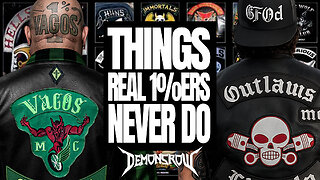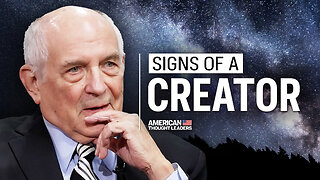Premium Only Content

Episode 3279: The Jesus Book - Michael Koulianos
When my cousin Michael first told me about Michael Koulianos, (koo-LEE-ah-nōs) I was struck by his enthusiasm. He spoke with respect and admiration for this Protestant minister, describing his ministry as deeply Christ-centered and even noting that many of Koulianos’ views seemed “almost Catholic.” Out of charity and curiosity, I looked into him. I discovered that Koulianos, born into a Greek Orthodox family and later converted to Protestantism, has built a ministry called Jesus Image a movement focused on revival, worship, and the felt presence of the Holy Spirit. His books, The Jesus Book, Holy Spirit: The One Who Makes Jesus Real, and Jesus 365: A Daily Devotional with the Son of God, are written with zeal and passion for Jesus. And yet, as a Traditional Catholic, I cannot help but notice the gaps. While his writings emphasize intimacy, emotion, and personal experience, they often leave aside the deeper, sacramental reality of Christ’s presence, the unity of His Mystical Body, and the doctrinal truths handed down through Apostolic Tradition. My cousin is a good and devout man, and in our conversations he likes to remind me that even if we practice differently, we both have Christ in common. And he is right Christ is our common ground. But fidelity to Christ demands fidelity to His Church, His sacraments, and His truth. And so, guided by the Holy Ghost and mindful of the charity that St. Paul speaks of, I want to reflect on Michael Koulianos’ works from a Traditional Catholic perspective not to tear down, but to build up; not to condemn, but to point toward the fullness of Christ found in His Church.
Michael Koulianos
Background & journey
• He was born in Tarpon Springs, Florida and raised in a Greek Orthodox family. He reports a conversion to Protestant Christianity at age 12, and began preaching at age 16.
• At a young age he experienced what he describes as a supernatural healing (Epstein-Barr disease) and that event became formative in his ministry.
• He is married to Jessica Koulianos (née Hinn), daughter of televangelist Benny Hinn, whom I sure you are all very familiar with.
• Michael and Jessica have children. His wife co-leads the ministry with him.
Ministry & influence
• Jesus Image was founded in 2007 under his leadership and has grown into a multifaceted ministry.
• The ministry emphasizes revivalist themes: worship, dynamic preaching, healing, the power of the Holy Spirit, global missions, and training believers to carry a “Jesus presence.”
• Michael has spoken at large evangelistic gatherings like The Send (which drew tens of thousands in Orlando) and is connected within charismatic/pentecostal networks.
Key themes & teachings
• A major thrust of his message: “Falling in love with Jesus” in a deep, personal way, and building the church around the presence of Christ rather than just programs.
• Emphasis on the Holy Spirit’s power, healing, and supernatural ministry.
• He writes about vision, revival, discipleship and raising up a generation of believers with bold faith.
So I wanted to take time in this episode to cover his book from Traditional Catholic perspective. The Spirit of Truth: A Traditional Catholic Response to Evangelical Devotionalism
But before I do , so I am guided in charity by the Holy Ghost lets begin with a prayer.
Opening Prayer
“O Holy Spirit, Spirit of Truth and Sanctity, fill our minds with heavenly light and inflame our hearts with the fire of Thy love, that we may cling always to Christ, the Eternal Word, and remain faithful to the Church He founded. Through the intercession of the Blessed Virgin Mary, Spouse of the Holy Spirit, guard us from error and lead us into the fullness of truth. Amen.”
Introduction
Many modern Christians today are being shaped by books like The Jesus Book, Holy Spirit. These writings often come from charismatic or evangelical Protestant authors. They emphasize a personal and emotional experience of Christ, focusing on daily devotionals, spontaneous prayer, and the Holy Ghost as the one who makes Jesus “real.”
Now, on the surface, this may sound good and appealing. After all, who wouldn’t want Jesus to be “real” in their lives every day? But here’s the problem: these writings almost always detach Christ from the sacraments, the liturgy, and the unbroken Tradition of Christs mystical body, the Church. They reduce Christ to a feeling, an emotional spark, a private devotion instead of rooting Him in the objective reality of His presence in the Church He founded.
So let’s take a look at these kinds of devotional trends: To begin we can never separate Christ from the very sacraments he instituted. We simply cannot without refusing his very words.
Christ is made real through the sacraments, not through subjective feelings.
• Prayer must be rooted in the liturgy, not only in private devotion.
• The Holy Ghost sanctifies through the Church, not in isolation.
• Salvation requires perseverance in grace, not instant assurance.
• And that true renewal is found in Tradition, not novelty.
• Above all Christ demanded unity in his Church.
In His prayer to the Father before His Passion, Jesus explicitly asks for unity among His disciples:
“I do not pray for these only, but also for those who believe in me through their word, that they may all be one; even as you, Father, are in me, and I in you, that they also may be in us, so that the world may believe that you have sent me. The glory which you have given me I have given to them, that they may be one even as we are one, I in them and you in me, that they may become perfectly one...” (John 17:20–23)
Here Christ ties the unity of believers to the unity between Himself and the Father perfect and indivisible. So Christ being God and all knowing he knew there would come a time where man would decide what his church was and would go their own way in his name.
Jesus proclaims that His mission is to gather all under a single shepherd:
“And I have other sheep, that are not of this fold; I must bring them also, and they will heed my voice. So there shall be one flock, one shepherd.” (John 10:16)
This makes clear that division was never His will He came to unite all His followers under His authority.
“Every kingdom divided against itself is laid waste, and no city or house divided against itself will stand.” (Matthew 12:25)
Though spoken about casting out demons, this principle applies to His Church: division contradicts His mission and leads to destruction.
“And I tell you, you are Peter, and on this rock I will build my Church, and the powers of death shall not prevail against it. I will give you the keys of the kingdom of heaven...” (Matthew 16:18–19)
Christ gives Peter a singular leadership role, ensuring the Church’s unity through one shepherd on earth who safeguards the flock.
While not Christ’s direct words, Paul reflects Christ’s will:
“Eager to maintain the unity of the Spirit in the bond of peace. There is one body and one Spirit, just as you were called to the one hope that belongs to your call, one Lord, one faith, one baptism, one God and Father of us all...” (Ephesians 4:3–6)
This echoes Christ’s prayer in John 17.
St. Paul warns about “itching ears” in his Second Letter to Timothy:
“For the time will come when they will not endure sound doctrine; but, having itching ears, they will heap up for themselves teachers according to their own lusts. And they will turn away their hearing from the truth, and will be turned aside to fables.” 2 Timothy 4:3–4
Meaning of “Itching Ears”
• Itching ears is a metaphor for people who only want to hear teachings that are pleasant, flattering, or in agreement with their own desires.
• Instead of enduring sound doctrine (the truth handed down from Christ and the Apostles), they search for teachers who tell them what they want to hear rather than what they need to hear.
• Paul contrasts this with Timothy’s duty to “preach the word, be instant in season and out of season, reprove, entreat, rebuke in all patience and doctrine” (2 Tim. 4:2).
Now before I continue, I just want to say that I am a nobody in authority but a simple Catholic Nono with a microphone and it would be so very easy to just go along out of friendship and possibly human emotion to agree with all the Protestants profess out of a kind of charity or possibly humility but it would be a false charity and a false humility because if I truly loved them I would want them to save their soul first. Again, I judge no man because only Christ will judge but I also must stand true to his mystical body (his church) here on earth.
Now being a Traditional Catholic I will give you my view on Michaels book.
Traditional Catholic Understanding
• The scripture passages cited are warning against modernism, relativism, and false gospels that cater to worldly appetites.
• The Church Fathers and traditional commentators stress that fidelity to the apostolic faith requires accepting hard truths, not merely comforting words.
Segment 1: Christ Made Real: The Sacraments, Not Sentiment
Evangelical works like Holy Spirit: The One Who Makes Jesus Real tell us that the Spirit makes Christ real in our lives by stirring up emotions, by giving us a sense of intimacy, or by creating personal experiences. But Traditional Catholicism teaches us something far deeper: Christ is made present in the Eucharist. We don’t deserve it, we can’t demand it, he does it freely because he ordained it.
In John 6:51, Jesus says, “I am the living bread that came down from heaven. Whoever eats of this bread will live forever; and the bread that I will give is My flesh for the life of the world.” This is not symbolic. At the Council of Trent, the Church defined that in the Eucharist, the bread and wine are changed into the Body, Blood, Soul, and Divinity of Christ Himself.
This is the deepest way the Holy Spirit makes Jesus “real.” Not in a feeling. Not in a rush of emotion. But in the altar at every Mass, where heaven and earth meet.
• St. John Vianney said: “If we really understood the Mass, we would die of joy.”
• St. Thomas Aquinas wrote the hymn Adoro Te Devote, reminding us that although our senses fail, faith assures us that Christ is truly present under the appearance of bread and wine.
So, while modern devotional books encourage us to “feel” Jesus, Catholics know that Christ is real objectively, whether we feel Him or not, because He is sacramentally present in the Eucharist.
Segment 2: Devotion vs. Liturgy
A book like Jesus 365 promotes the idea of a daily devotional usually a short reflection, maybe a verse, and some personal thoughts. While these can inspire us, they fall short if they replace the Church’s official prayer.
From the beginning, Christians prayed together in liturgy. Acts 2:42 says, “They devoted themselves to the apostles’ teaching and fellowship, to the breaking of bread and the prayers.” Notice: Scripture, communion, and formal prayers not just private devotion.
• The Mass is the highest prayer of the Church.
• The Divine Office (the Breviary) sanctifies the hours of the day, uniting priests, religious, and laity around the world.
St. Benedict taught: “Let nothing be preferred to the Work of God.” By this, he meant the Divine Office and the liturgy.
Devotionals have their place, but they are secondary. The Mass and the Divine Office are the heartbeat of Catholic life. To replace liturgy with a “feel-good” devotional is to make faith a private project, detached from the Mystical Body of Christ.
Segment 3: The Holy Spirit’s Mission
Charismatic spirituality often portrays the Holy Spirit as the one who bypasses the Church and institutional religion, giving individuals a direct “experience” of Jesus. But Catholic Tradition teaches that the Spirit’s mission is to sanctify through the Church. The Church is often called the Bride of Christ.
In the Gospels, Jesus calls Himself the Bridegroom:
“Can the wedding guests mourn as long as the bridegroom is with them?” (Matthew 9:15, cf. Mark 2:19–20, Luke 5:34–35).
Here Christ is clearly the Bridegroom, and by implication His disciples the beginnings of the Church are the Bride.
So, as Bishop Sheen so aptly said. If Christ were to abandon his Church for other Churches he would be committing spiritual adultery.
Jesus promised in John 16:13: “When the Spirit of truth comes, He will guide you into all the truth.” The Spirit was poured out at Pentecost, not upon isolated individuals, but upon the Apostles gathered with Mary in prayer the Church in her seed form.
• Pope Leo XIII, in his encyclical Divinum Illud Munus, taught that the Spirit is the “soul of the Church,” guiding her in truth.
• St. Irenaeus in the 2nd century wrote: “Where the Church is, there is the Spirit of God; and where the Spirit of God is, there is the Church.”
The Spirit never contradicts the Church, never creates private “mini-Churches,” and never stirs emotions to oppose doctrine. He builds unity, truth, and fidelity.
Segment 4: Salvation: Perseverance, Not Instant Assurance
Books like Jesus 365 often assume once you’ve “accepted Jesus,” your salvation is secure forever. This is the Protestant notion of “once saved, always saved.”
The Catholic Church teaches otherwise. Yes, we are justified by grace at Baptism, but salvation requires perseverance. Jesus Himself warns in Matthew 24:13: “He who endures to the end will be saved.”
• St. Augustine said: “He who created you without you will not justify you without you.”
• We must cooperate with grace, avoid mortal sin, and remain faithful to the sacraments.
The saints never presumed salvation. They prayed, fasted, confessed, and begged God for final perseverance. That is why Catholics pray the Hail Mary: “Pray for us sinners, now and at the hour of our death.” We know salvation is not a one-time prayer, but a lifelong fidelity.
Segment 5: Tradition vs. Novelty
Evangelical devotional culture thrives on constant novelty: a new book each year, a new devotional guide, a new way of “feeling” close to God. But Catholicism teaches that the faith is complete in Christ and handed down in Tradition.
2 Thessalonians 2:15 commands us: “Stand firm and hold fast to the traditions that you were taught, either by word of mouth or by our letter.”
• St. Vincent of Lerins in the 5th century said: “We hold that faith which has been believed everywhere, always, and by all.”
• Pope Pius IX condemned the idea of adapting the faith to modern sentiment in his Syllabus of Errors.
We don’t need a new devotional every year. We need to return to the rosary, the Mass, the Breviary, the writings of the saints. These are timeless, unchanging, and full of grace.
Conclusion
The evangelical world seeks to make Jesus “real” through feelings, novelties, and personal devotions. But the Traditional Catholic Church teaches that Jesus is already truly real:
• In the Eucharist
• In the liturgy
• In the Magisterium of the Church
• In the Deposit of Faith handed down through Tradition
The Holy Spirit does not create new religions every few years. He safeguards the Church Christ founded. Our task is not to chase new spiritual experiences, but to cling to the sacraments, persevere in grace, and hold fast to the Tradition once delivered to the saints.
So I don’t know Michael but like my Cousin I want him to return to the one true Church. He may not have the notarity or feel the same independence he has but what good will that all do him if he loses his soul.
So I say to both Michaels:
1. Zeal for Christ and Evangelism
• Within the Catholic Church: Zeal is not abandoned but purified and rightly ordered. The saints like St. Francis Xavier, St. Dominic, and St. Francis of Assisi show that true zeal is most effective when it is rooted in the sacraments and obedience to the Church’s Magisterium.
• How to Use It: They can channel their fire for evangelization into proclaiming not only Christ in general, but Christ in His fullness really present in the Eucharist, teaching through His Church, and reigning through His Vicar. By anchoring zeal in sacramental grace, evangelization avoids becoming mere emotionalism and becomes a supernatural work.
• Effect on the Church Militant: Such zeal, properly formed, strengthens the army of Christ on earth by rallying others to embrace the faith courageously and defend it against error.
2. Emphasis on Personal Encounter with Jesus
• Within the Catholic Church: The Catholic faith is the original “personal encounter” with Christ but not only spiritually, also sacramentally. Baptism, Confession, the Eucharist, and Confirmation are encounters with the living Christ that transform the soul.
• How to Use It: They can guide people to see that the deepest and most intimate encounter with Jesus occurs not just in prayer or preaching, but when one kneels before the tabernacle or receives Our Lord in Holy Communion.
• Effect on the Church Militant: Soldiers of Christ who know the Captain personally fight with courage. By emphasizing sacramental encounters, the Church Militant becomes not just a movement of words and feelings, but an army armed with grace and divine power.
3. Commitment to Discipleship and Training
• Within the Catholic Church: True discipleship is not just training in Scripture and prayer but in the full deposit of faith doctrine, liturgy, and moral teaching. Christ commanded the Apostles to “teach them to observe all that I have commanded you” (Matt. 28:20).
• How to Use It: Their framework for discipleship (like his “Jesus School”) can find its fullness when modeled after the Church’s catechetical tradition think of the Baltimore Catechism, the Fathers of the Church, and the saints’ writings. Training believers to be warriors for Christ in doctrine and virtue ensures that discipleship is not shallow but deeply rooted.
• Effect on the Church Militant: Proper training forms soldiers who are not only enthusiastic but disciplined, knowledgeable, and faithful much like the disciplined Roman soldiers Paul often used as metaphors. Well-trained Catholics strengthen the Church Militant’s unity and power against modern heresies and relativism.
Conclusion: From Good to Perfect
In the end, what men like Michael Koulianos express with passion and zeal for Christ must be acknowledged but also purified, elevated, and completed in the one true faith handed down from the Apostles. His writings may stir the heart to long for Jesus, but without the sacraments, without the liturgy, and without the sure guidance of the Magisterium, that longing risks remaining incomplete, tethered more to emotion than to truth. Our Lord did not leave us a book of devotionals; He left us His very Body and Blood, His Church, His sacraments, and the promise that the gates of hell would not prevail against her. If we truly love our separated brethren, we must desire not that they stop seeking Christ, but that they find Him where He is most fully present in the Holy Eucharist, in the unity of His Mystical Body, and in the unchanging Tradition of the Catholic Church. For it is here, and here alone, that the Spirit of Truth makes Jesus not only “real” to our hearts, but living and abiding with us until the end of time.
Closing Prayer
“O Lord Jesus Christ, truly present in the Most Holy Sacrament, we thank You for giving us the gift of Your Church, Your sacraments, and Your Spirit of truth. Guard us against false novelties, and strengthen us in fidelity to Tradition. Through the intercession of the Blessed Virgin Mary and all the saints, keep us steadfast until we see You face to face in eternity. Amen.”
-
 2:56:28
2:56:28
IsaiahLCarter
10 hours ago $4.27 earnedThe Tri-State Commission, Election Weekend Edition || APOSTATE RADIO 033 (Guest: Adam B. Coleman)
17.8K4 -
 15:03
15:03
Demons Row
5 hours ago $5.53 earnedThings Real 1%ers Never Do! 💀🏍️
23.8K10 -
 35:27
35:27
megimu32
8 hours agoMEGI + PEPPY LIVE FROM DREAMHACK!
150K12 -
 1:03:23
1:03:23
Tactical Advisor
12 hours agoNew Gun Unboxing | Vault Room Live Stream 044
222K36 -
 19:12
19:12
Robbi On The Record
13 hours ago $18.69 earnedThe Loneliness Epidemic: AN INVESTIGATION
61.8K91 -
 14:45
14:45
Mrgunsngear
1 day ago $110.28 earnedFletcher Rifle Works Texas Flood 30 Caliber 3D Printed Titanium Suppressor Test & Review
107K26 -
 17:17
17:17
Lady Decade
1 day ago $7.79 earnedMortal Kombat Legacy Kollection is Causing Outrage
70.3K12 -
 35:51
35:51
Athlete & Artist Show
1 day ago $13.63 earnedIs Ryan Smith The Best Owner In The NHL?
86.5K9 -
 22:56
22:56
American Thought Leaders
2 days agoCharles Murray: I Thought Religion Was Irrelevant to Me. I Was Wrong.
71.6K39 -
 36:22
36:22
Brad Owen Poker
14 hours agoGIGANTIC $17,000+ Pot In BOBBY’S ROOM! TRAPPING Top Pro w/FULL HOUSE!! Big Win! Poker Vlog Ep 326
76.7K6